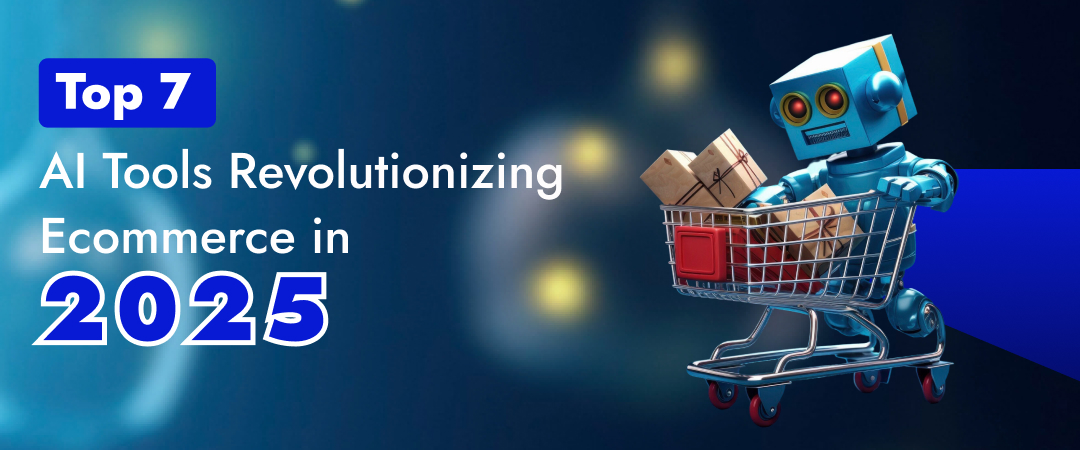AI is driving rapid growth in ecommerce.
From intelligent product recommendations to automated support, these tools streamline operations and help businesses grow.
Here are seven AI tools making a major impact in 2025.
1. Shopify Magic – Smarter Selling with AI
Shopify Magic adds native AI features to the Shopify platform.
It helps merchants create product descriptions, automate replies, and understand customer behavior.
With just a few inputs, it generates content optimized for sales and SEO.
AI assists in writing headlines, email copy, and marketing texts without external tools.
It also helps with order management predictions, reducing customer wait times.
Small and medium businesses benefit the most from its plug-and-play integration.
This tool is built directly into Shopify, requiring no separate installation.
Its AI engine continues learning from store performance, enhancing output over time.
Key Features
-
AI-generated product descriptions
-
Email marketing content suggestions
-
Customer insight analysis
Best Use Cases
-
Rapid store setup
-
Scaling product listings
-
Enhancing SEO automatically
2. ChatGPT Plugins for Ecommerce Support
OpenAI’s ChatGPT plugins give ecommerce businesses custom AI chat support.
With product feed integration, ChatGPT answers customer questions using live data.
It provides consistent, 24/7 responses without human agents.
For example, customers can ask about shipping, inventory, or product specs—and get instant replies.
Stores can personalize responses with tone preferences and brand voice settings.
These plugins improve satisfaction, reduce bounce rates, and assist with conversions.
Natural Language Responses
-
Handles queries like: “Do you have size 9?” or “What’s your return policy?”
-
Natural tone helps retain customer trust
Integration with Product Data
-
Real-time access to store inventory, shipping, and pricing
-
Works with Shopify, WooCommerce, and custom sites
3. Clerk.io – Real-Time Personalization
Clerk.io is an AI tool that focuses on dynamic customer experience.
It uses real-time behavior tracking to personalize product displays, search results, and recommendations.
Unlike static product grids, Clerk.io updates based on user actions.
Customers see what matters most to them, increasing conversion potential.
The AI also boosts AOV through personalized cross-sell and upsell suggestions.
Its seamless backend connection lets store owners automate merchandising without constant input.
Dynamic Search and Recommendations
-
Predicts what users want based on current actions
-
Adapts product suggestions in milliseconds
Cross-Sell and Upsell Optimization
-
Adds relevant items to cart page
-
Improves revenue per visitor
4. Adobe Sensei – Predictive Insights for Better Targeting
Adobe Sensei offers enterprise-level AI to ecommerce platforms via Adobe Commerce.
It uses machine learning to understand buyer intent and segment audiences.
Retailers can personalize site content, emails, and ads in real time.
Sensei’s predictive analytics also helps forecast demand and reduce marketing waste.
Data from customer journeys feeds directly into its models for ongoing improvement.
Customer Behavior Analytics
-
Segments based on real-time behavior
-
Reduces abandoned cart rate with targeted actions
Content Personalization
-
Dynamic banners and homepage sections
-
AI-curated product rows based on preferences
5. ViSenze – Visual Search and Product Discovery
ViSenze enables customers to search using images.
Users can upload a photo and find similar products instantly.
It’s especially useful in fashion and furniture, where visuals drive decisions.
AI processes the image, detects features, and matches it to inventory.
Stores using ViSenze experience higher engagement and lower bounce rates.
It supports mobile-first UX and can be integrated with AR tools.
Image-Based Recommendations
-
Suggests similar items to uploaded photos
-
Enhances discoverability with fewer clicks
Use in Fashion & Retail
-
Matches color, pattern, and style
-
Increases customer confidence in purchase
6. Re:amaze – AI-Powered Customer Support
Re:amaze is a multichannel AI support tool for ecommerce.
It unifies emails, chat, social messages, and FAQs into one dashboard.
Its AI automates replies and assigns messages based on urgency or topic.
Common queries are handled automatically, freeing up staff for complex issues.
Businesses reduce response times and improve satisfaction scores.
It also learns from past tickets, improving accuracy over time.
Multichannel Automation
-
Chat, email, social DM responses
-
Handles repetitive queries instantly
Response Management
-
Tags and routes tickets automatically
-
Maintains brand consistency across channels
7. Pecan AI – Demand Forecasting Made Simple
Pecan AI brings advanced forecasting to ecommerce.
It analyzes historical sales, seasonality, and market data to predict demand.
Retailers use it to plan inventory, reduce overstock, and meet customer expectations.
The tool presents insights in a clean dashboard, usable by non-technical users.
Its low-code setup allows fast deployment into ecommerce systems.
AI Forecast Models
-
Predicts future demand by product, region, or category
-
Supports promotional planning
Supply Chain Benefits
-
Reduces excess inventory
-
Ensures better stock availability during peaks
Final Thoughts: Choosing the Right AI Tool for Your Store
Each AI tool solves a unique ecommerce challenge.
Some focus on personalization, others on automation or support.
Choose based on your biggest bottlenecks:
Need better customer interaction? Start with ChatGPT or Re:amaze.
Want more efficient sales and inventory? Pecan AI or Clerk.io are strong picks.
AI in ecommerce isn’t optional anymore.
It’s the standard for speed, precision, and growth in 2025.


